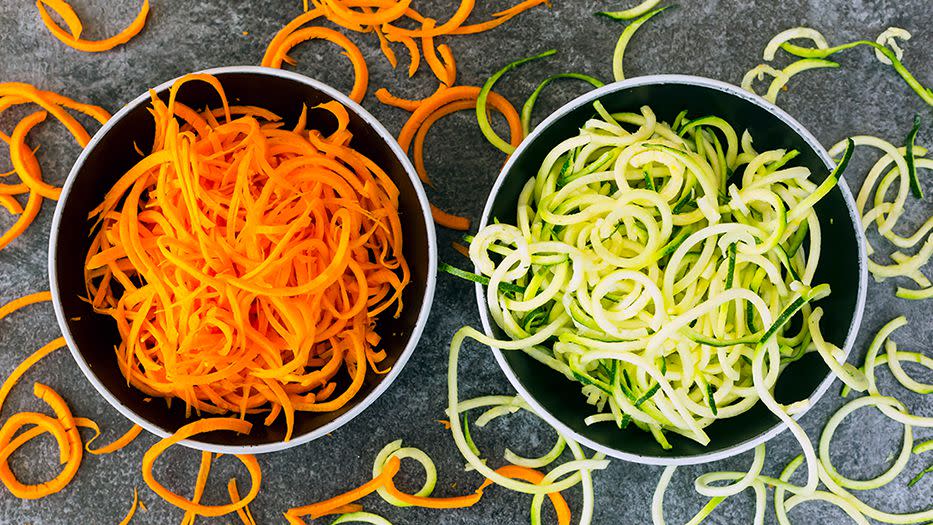Is a Low-Carb Keto Diet Better for Endurance Athletes?

Photo: Westend61 / Getty Images
You'd think ultra runners logging 100+ miles a week would be loading up on pasta and bagels to prep for a big race. But a growing number of endurance athletes are doing the opposite: following a low-carb keto diet to fuel their super-long runs.
"Many endurance athletes have found success with the ketogenic diet because fat provides more energy than carbs," says Jennifer Silverman, M.S., nutrition specialist at Tone House in New York.
Take Nicole Kalogeropoulos and fiancé Zach Bitter, Altra athletes currently training for the 100-mile Western States Endurance Run. The couple follows a low-carb keto diet rich in eggs, salmon, and nuts. More surprisingly, they say the low-carb life has improved their performance. (Considering the diet? Try this keto meal plan for beginners.)
"Since I've been more committed to a high-fat diet, I've been able to recover faster, allowing me to train at a higher level consistently," says Kalogeropolous. "Plus, I don't need to take in as much food during races, and I have fewer stomach issues than I did on a higher-carb diet."
But wait, aren't endurance athletes supposed to load up on pasta before a big race, then suffer through sugary energy gels every few miles to keep their energy up?
Apparently, only if your body is stuck in a sugar-dependent state. "A high-carbohydrate diet locks you into a cycle of dependency on glucose because carbs force your body to burn sugar instead of fat," says Jeff Volek, Ph.D., R.D., a professor of human sciences at The Ohio State University who studies ketosis extensively. And since your body's sugar stores can only fuel you through a couple hours of intense exercise, you're stuck continuously consuming carbs to keep your energy up, he explains.
Break this cycle, and your body will use fat-a more efficient source of energy-as fuel instead, which should theoretically translate to less dependence on sugary gels and chews during an endurance race, and possibly more energy. (P.S. Here's your start-to-finish guide to fueling for a half marathon.)
Even better, ketosis could help you avoid hitting the dreaded "wall" toward the end of a long run or bike ride. That's because blood ketones, which fuel your brain just as much as your body, don't sharply decline in the brain the same way glucose does, so your energy levels and mood stay much more stable. "Ketones have been shown to offer remarkable protection from the signs and symptoms of low blood sugar," says Volek.
Bitter has seen this in practice during his runs and races. He started following a low-carb Atkins diet in 2011, and though he felt a little lethargic at first (this is normal as your body adjusts to using fat as its new energy source), he doesn't need to fuel as much during events-yet he feels better. "I fuel less for the same energy level, recover faster, and sleep more soundly," he says. (See also: I Tried the Keto Diet and Lost More Weight Than I Expected To)
It sounds counterintuitive since you've been told that carbs are everything when it comes to endurance-but this age-old suggestion is actually based on limited research. As Volek explains in a European Journal of Sport Science review, there's only been one placebo-controlled study on the subject, and it didn't show any performance benefit to loading up on carbs leading up to an endurance event.
That said, there are some things to consider before adopting a keto diet for your next marathon. Check out the things to know about exercising on the keto diet, and keep these low-carb tips in mind before trying it yourself.
Load up on electrolytes.
"The fat-adapted body tends to discard more salt," says Volek. To up your sodium intake, he suggests consuming a couple cups of broth every day and making sure you don't choose no-sodium versions of foods, like nuts. Bitter also takes electrolyte supplements during his ultras. (More: How to Stay Hydrated When Training for an Endurance Race)
Start in your off-season.
Don't switch things up right before a race. "The process of keto adaptation fundamentally changes the way your cells use fuel-and that takes time," says Volek. This means you might notice a dip in performance during the first couple weeks, as your body becomes less dependent on carbs. But you should start to feel better within a month as your body adjusts.
Figure out what works for you.
"Just as we all won't get the same results from a workout, it's impossible to make a generalization about what eating plan will benefit everyone," says Silverman.
Even Kalogeropolous and Bitter have different approaches to the same goal: Bitter monitors his ketone levels with blood strips and follows a program he calls "periodizing carb intake based on lifestyle." He nearly eliminates carbs when he's recovering or training lightly, then follows a diet of about 10 percent carbs when training at peak volume, and 20 to 30 percent when training at his highest volume and intensity. (Learn more about carb cycling.)
Kalogeropoulos is a little more flexible. "I eat a low-carb diet, but I'm not always so regimented since I travel so much for work," she says. "Following a specific plan is less important than paying attention to how I feel."

